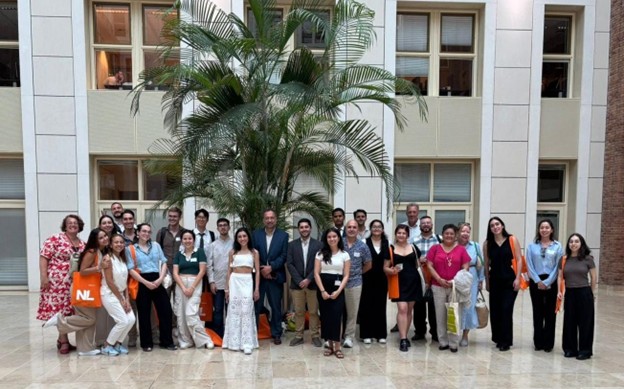Become Glocal: Education meets industry
17 July 2025
How can global collaboration between universities and industry boost employability? Become GLOCAL built bridges across regions to co-create hybrid, skills-based learning experiences.

How can universities and companies boost student employability across continents? The Become GLOCAL conference ‘Employability and Global Interaction’ brought together educators, students, and industry to co-create hybrid, skills-based learning.
Earlier this month, educators, students, policymakers, and representatives from local industries and national governments gathered during the international conference ‘Employability and Global Interaction’, marking a key milestone in the Become GLOCAL project, in which research group Global Learning has contributed. The event took place at Universidad Católica de Manizales (Colombia), with simultaneous activities in the Netherlands (at THUAS), Chile, and Spain.
The conference provided a platform to exchange insights on how universities and companies across Latin America and Europe can foster employability through global interaction and intersectoral collaboration. The event showcased the results of a rich process of international co-creation and capacity building.
A bridge between education, industry, and continents
Launched in January 2024 and co-funded by the European Commission, Become GLOCAL is a two-year initiative coordinated by Universidad Católica de Manizales (Colombia). The project aims to modernise internationalisation strategies at regional universities in Latin America and Europe by connecting them more closely to local industries.
The consortium began by identifying ten key employability skills, based on parallel dialogues with industry stakeholders in Colombia, Chile, Spain, and the Netherlands. In parallel, educators across the consortium co-developed a shared educational foundation through a COIL-based lecturer training program.
THUAS lecturer Viviana Cubillo reflects on that process: “The lecturer trajectory helped us understand the overall dynamic and purpose of the project, and it provided a solid foundation for working together. The sessions allowed us to align our ideas, build trust, and truly grasp the pedagogical goals we were aiming for.”
Building on this groundwork, international teams of educators designed three pilot employability courses in close collaboration with companies and public partners. Each course blended online learning, mentoring, and real-life challenge-based learning, and was delivered in both local and international formats.
Throughout spring 2025, more than 80 students participated in these hybrid pilot courses and engaged in immersive, real-world learning experiences with companies in Manizales, Concepción, Valencia, and The Hague. These immersions allowed students to build skills, experience, and networks, regionally or across borders.
Sustainable innovation and long-term impact
In July 2025, educators and industry representatives came together at THUAS for a co-creation bootcamp, where interdisciplinary teams further developed hybrid learning designs tailored to regional needs. The focus: aligning pedagogy with real labor market challenges.
One of the pilot courses was co-created by THUAS lecturers Viviana Cubillo and Celso Meiller, alongside colleagues from Chile and Colombia, and in partnership with Johnson & Johnson and the Netherlands Enterprise Agency (RVO). The course offered students an integrated learning journey that combined online workshops, company mentoring, live masterclasses, and in-person networking sessions.
Celso Meiller notes: “What made this experience unique was how we brought companies into the process from day one. It wasn’t easy, but aligning corporate and educational goals was key to our success.”
Scaling knowledge and building ecosystems
To support long-term sustainability, the consortium created a free MOOC for educators, available at www.becomeglocal.com. This open-access course captures the project’s pedagogical and collaborative insights for wider use.
Project coordinator Matias Marín (Universidad Católica de Manizales) and work package leader Marloes Ambagts (THUAS) stress that much of the project’s success stems from intentional, inclusive co-creation. “We took time to build trust, strong connections, and shared leadership,” says Marín.
Ambagts adds: “Especially in a complex North–South partnership like this, it’s essential to create conditions for true dialogue and shared experimentation across boundaries.”
Transformative experiences beyond the classroom
While the project’s primary aim was to enhance student employability, its co-creative and dialogical approach also had a transformative impact on educators and partners.
Lecturer Sergio Arias (Universidad de Manizales) shared: “I thought I was designing a program for students, but I didn’t expect to be transformed by it myself.”
For student Carolina (Universidad Católica de la Santísima Concepción, Chile), the experience was equally impactful: “This program was like a bridge, a bridge between people from universities, companies, and governments, where knowledge and opportunities travel both ways.”
Student Kasper (THUAS) said: “I joined this program with a transactional goal in mind- finding an internship - however, I discovered that this program gave me much more than that. It allowed me to meet people from another side of the globe, whom I can now proudly call my friends. Even though we come from completely different cultures we are quite similar, we have the same dreams, same goals. And I probably found an internship.”
Want to know more?
For more information about the Become GLOCAL project, take a look at the project’s website: www.becomeglocal.com. Or contact Marloes Ambagts - van Rooijen (Research Group Global Learning) at [email protected].